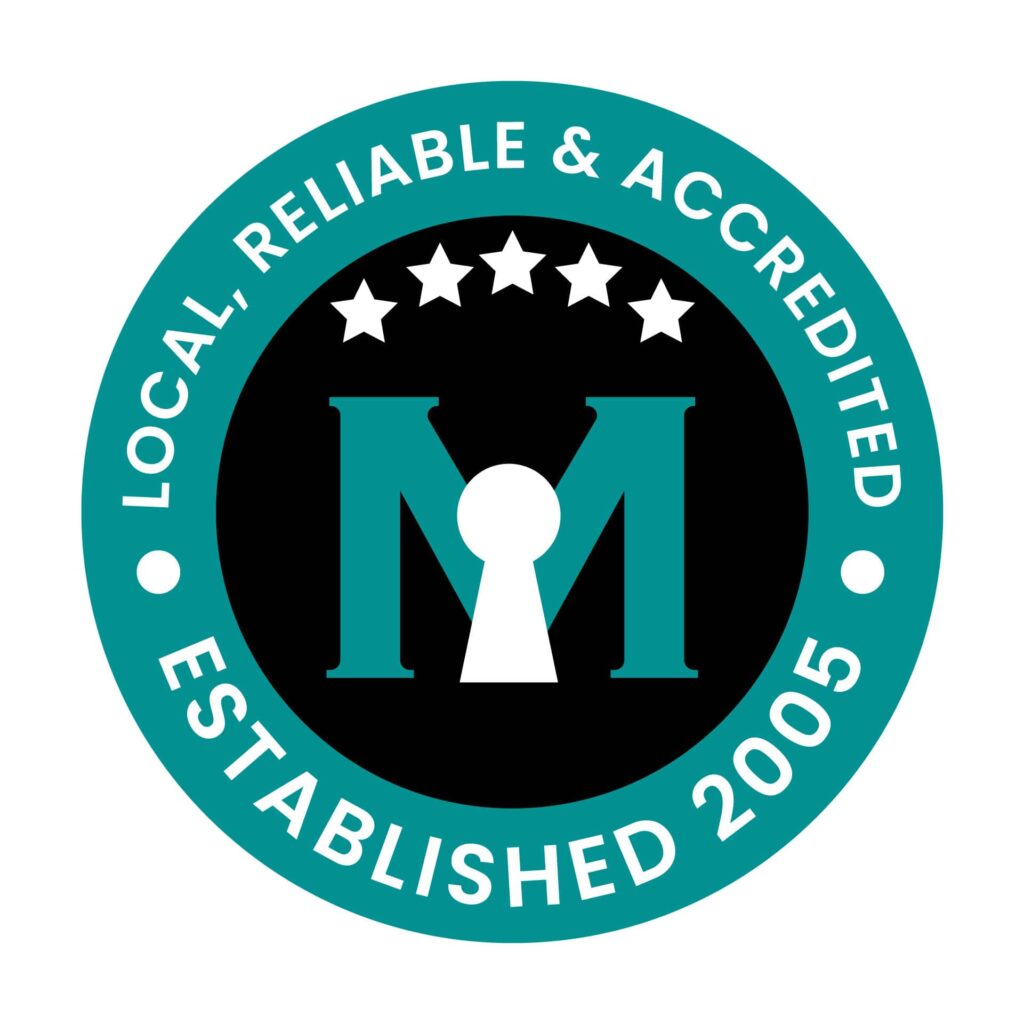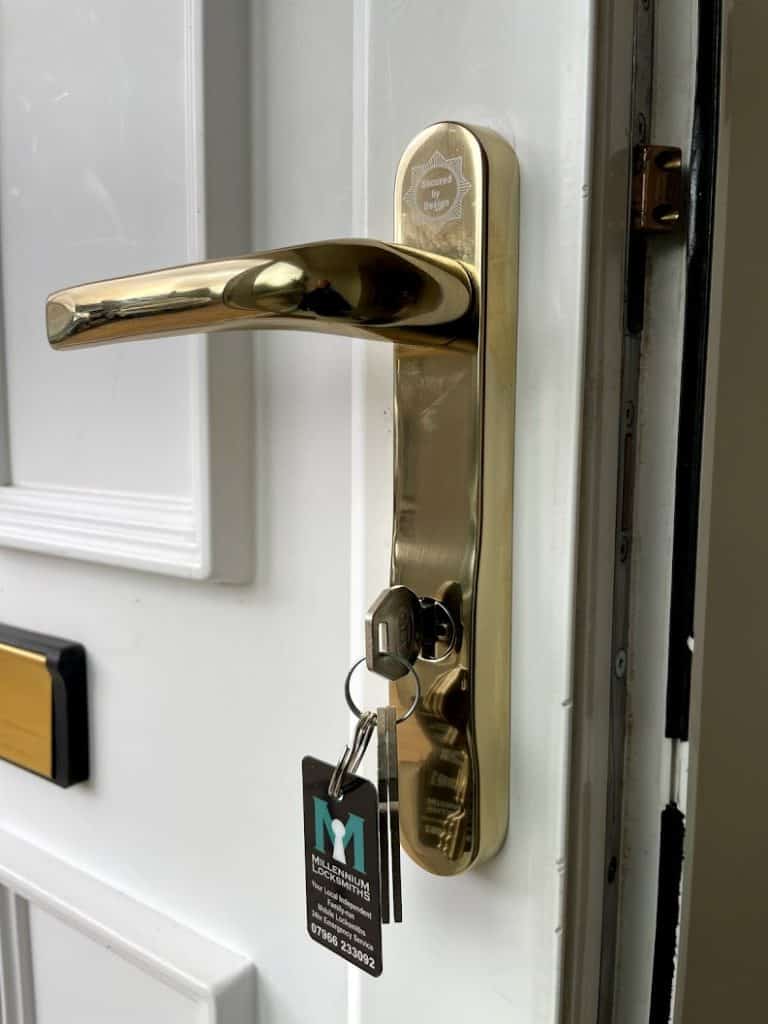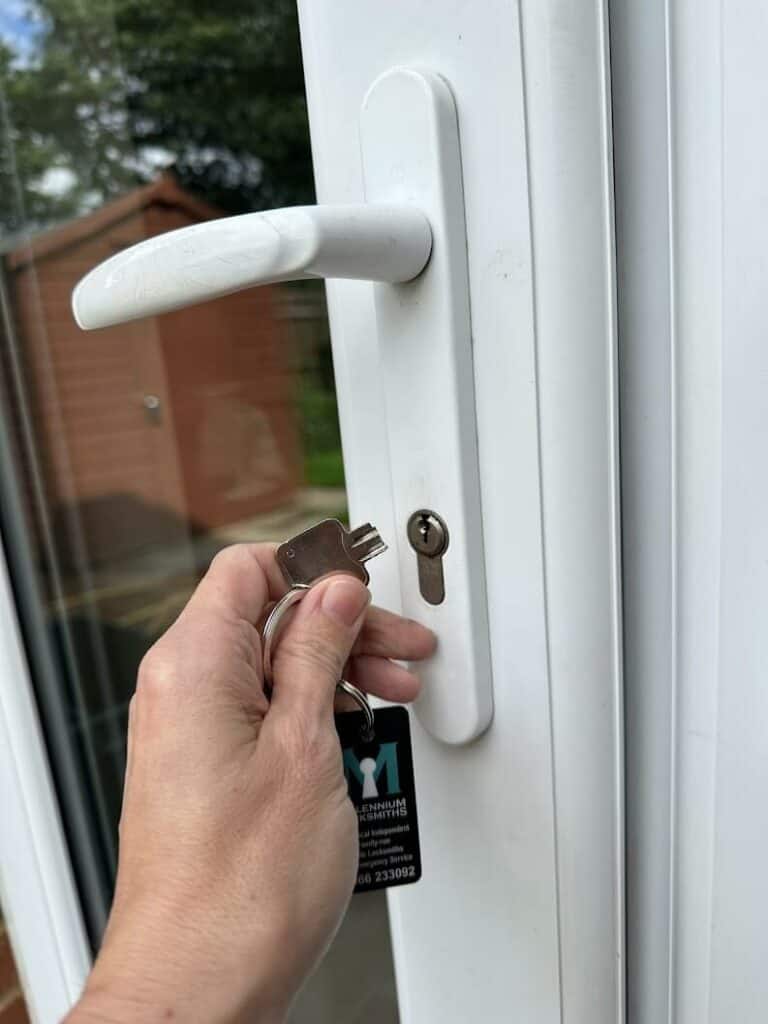When the temperature drops and the snow starts to fall, many of you will be ready to close up your house for winter. However, whether you’re planning on hibernating all winter or spending time away from home, it’s important to remember that there are a few things that you need to do before locking up.
An essential part of preparing for winter is checking your locks. If you’ve got a uPVC door, then this is especially important as it’s likely to be affected by the weather.
Depending on the weather you’re in, the locks in your home are far more likely to play up in extreme temperatures. Various climates, such as the cold weather can affect uPVC doors and cause a frozen door lock, whether a heatwave or a blizzard. If the weather fluctuates, your door frame can contract and expand. From stiff uPVC lock mechanisms to cylinders seizing up, you can run into a range of issues when the temperatures drop. You may find that you can’t turn the key in your door or window lock, or you might have had a problematic lock that’s got worse in the winter. For more information about uPVC door mechanisms, read below.
We’ve written up a few common problems that we’ve seen that you may be experiencing. It’s helpful to know that you’re having the same problem as others and you’re not just the odd one out!
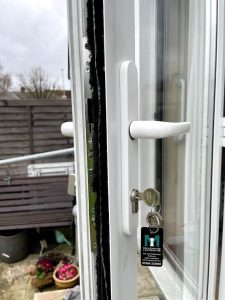
Table of Contents
uPVC Doors:
We see many uPVC doors playing up or dropping over time, similar to a wooden door warping, as the same issue applies to both doors. The door drops or moves over time and ends up moving the locking points to the point the door no longer locks. In some cases, we’ve been unable to open a door because a door has dropped so much!
uPVC doors are slightly different in their repair process as an entire mechanism needs repair/replacing, depending on what is wrong. Most modern uPVC door mechanisms have some adjustments so that we can work on them without issue. (If your uPVC door works fine when in the open position, it’s most likely an adjustment issue. Can’t lock/unlock the door when it’s open? It’ll be a deeper issue & the mechanism/cylinder needs repair/replacement.
If your home has ruined uPVC door locks, you’re most likely using a larger Euro Cylinder. Euro cylinders can work multi-point locks, so they’re used in uPVC doors. Euro cylinders can fail over time as parts will wear with general use. If your cylinder needs repair or replacement, we’re happy to help. Cylinder replacements are simple & easy to do, giving you an easy solution to fix your uPVC door.
Does the weather affect uPVC doors?
Is your uPVC door not locking like it used to? With the weather dropping so much in the winter, the temperature fluctuation is enough to make uPVC doors expand and contract. This causes issues with the alignment of uPVC doors, making it harder to lock/unlock the door. This also speeds up the “uPVC Drop” process as the door wears over time.
Sometimes when door problems are weather-related, you must wait the season out and deal with the issue. If it’s playing up in the summer, you may have to wait till the temperatures cool down for the uPVC door not to expand. There will be vital times, however, when having issues with your doors is unacceptable, which is when you need to call a locksmith! Leaving doors unlocked whilst you’re away from the house isn’t wise, especially with burglaries & other crimes on the rise in residential areas. If the lock issue stops you from securing your home, then it’s time to call a locksmith!
If you think the weather has affected your door, do not force it the next time you’re trying to open and close it. As long as you’re taking your time with shutting the door, You shouldn’t make the issue worse. If you’re forcing the door shut, you can cause damage to the internal locking mechanism, which isn’t ideal. This mechanism can be replaced, but you should if you can avoid it!
Can a uPVC door warp?:
You might find a few articles about warped doors if you’re researching common faults with uPVC doors. If this is the case, the warping should be very apparent, as you’ll see a clear bend where there shouldn’t be. Re-alignment won’t fix the issue with a warped door, so you’ll have to contact the supplier. Identifying if your door is bowed/warped should be straightforward, as you’ll see misalignment reasonably. Check the sides of the frame/door and see if it aligns properly. If not, you might have a warped door that can impede the door’s locking. Warped uPVC doors can also be unsafe, as they are easier to pry away from the locking mechanism.
Suppose your uPVC door has warped due to poor installation or manufacturing defects (or both). In that case, there’s a chance that it could warp again in future years – especially if left exposed to extreme temperatures or moisture levels.
uPVC door cylinders:
If you have a problem with your uPVC door and the lock, it’s easy to assume it’s an easy fix. However, many people get it wrong and end up paying for a new lock or suffering from problems later.
uPVC door cylinders are generally universal as manufacturers will stick to a specific type. Euro cylinders are the most common in the UK, so you’ll likely have one in your home. If you need to find out who produced your door, the metal strip down the edge of the door is an excellent place to find the manufacturer. Mechanisms are unique to their maker, so a door using a particular system must stay that way, as mixing manufacturers & models may worsen the problem.
There are two main types of key-operated systems for uPVC doors; mortise and rim locks – both operate slightly differently but essentially do the same thing.
uPVC door mechanism:
The uPVC mechanism can also be blamed for your uPVC door not locking. The locking mechanism runs across the entire length of the inner face of the door. This means that there are a few points of failure when it comes to diagnosing the issue. This may mean that we have to replace the entire mechanism. Specific parts could be hard to source, so replacing the entire thing may be more cost-effective. In some cases, we can work to replace the “gearbox” of the mechanism, which is a cheaper repair. However, it still uses a mechanism that is worn with age.
If you have been having problems with your uPVC door locking or unlocking, it is likely down to a problem with your lock or mechanism. These doors are very robust and rarely have issues other than normal wear and tear (which is why they have become so popular). There are some simple things that you can do yourself if you notice any problems with your locks, but if there is anything more serious, then we would recommend contacting an expert in uPVC door repairs as soon as possible.
Key related issues:
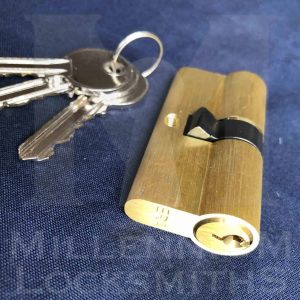
Like any lock, your key could get stuck in the cylinder if you’re not careful. Sometimes you can be forgetful and jam the wrong key in, or you might be unlucky and have something break internally, trapping it in. Either way, it’s important not to force the key out as you may break it off in the lock. Too much force will damage more lock cylinder parts, making repairing it much harder.
Your key could also be challenging to turn. You may have to do a frustrating “jiggling” process you have to do every time you lock/unlock the door. This could be down to overall wear on the cylinder, as internal parts will wear over time. Your key could also be worn depending on its age. If you’ve had a new key cut for the lock, the previous supplier could also cut it incorrectly! Our locksmiths ensure we cut a replica of your key if yours breaks. We can replicate any style of the domestic key as long as you have an existing copy.
Wooden Door Warping:
Wooden doors are probably the second most common type for homes that don’t use uPVC doors. Wooden doors won’t use a sophisticated mechanism found in a uPVC door as they use deadlocks/sash locks. Wooden doors are designed more uncomplicated but use much more rudimentary locking systems. Although not perfect, uPVC doors are ultimately safer as they are more secure. Your average wooden door will warp with extreme temperatures, especially in humid climates, as the humidity will affect the door.
Locks aren’t usually the problem with wooden doors, as we see a lot of warped frames/doors. This is usually due to the weather, especially in hot/cold months. The colder temperatures usually mean a lot of rain, which can cause wood to expand with moisture and contract as it dries out. The warping pushes the lockout of the line and means the locking points no longer match up.
What can I do if I’m having problems with my door?
If you’re having problems closing or locking your uPVC door, a DIY fix might not be the best thing to do. Depending on the problem you’re experiencing, your issue may not be solvable without replacing parts. Replacing parts yourself is also not recommended because uPVC mechanisms are complex objects that need proper installation. DIY lock installations may invalidate your home/contents insurance as your locks won’t be insured.
Employing the assistance of a professional locksmith is the best way to solve the issues with your door. Finding a professional locksmith who can offer an extensive and dependable service can be challenging, especially if you seek an expert provider. Experience is hard to find nowadays, so it’s good to choose those that have been in the industry for decades. The team at Millennium have decades of experience in the industry, reassuring anyone who enquires with us that they’re in safe hands. Having a damaged door is very unsafe and puts your home at risk. The point of call in this situation must be a reliable locksmith who can make your home safe. Our locksmiths work to secure your home as soon as possible, fitting new locks & mechanisms where needed.
If you’re having issues with your locks or need something looking at, give Millennium a ring! We’re available for any locksmith enquiries on 07966 233092 or check out our website for additional information uPVC Door Mechanisms
Are you looking for Locksmiths in Ruislip and the surrounding areas? Contact Millennium Locksmiths today for free locksmith quotes.

